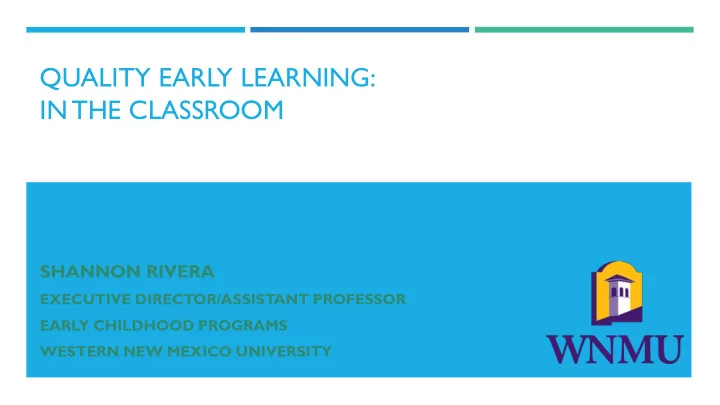

QUALITY EARLY LEARNING: IN THE CLASSROOM SHANNON RIVERA EXECUTIVE DIRECTOR/ASSISTANT PROFESSOR EARLY CHILDHOOD PROGRAMS WESTERN NEW MEXICO UNIVERSITY
OBJECTIVES QUALITY EARLY LEARNING IN THE CLASSROOM • PHILOSOPHIES OF EARLY CHILDHOOD EDUCATION • WORKFORCE DEVELOPMENT • SUPPORT THE GROWING CAPACITY OF HIGH QUALITY CHILDCARE IN NEW MEXICO •
QUALITY EARLY CHILDHOOD EDUCATION: IN THE CLASSROOM Early Learning occurs prenatal to age 8 Brain Development – Windows of Opportunity Difference between ECED and ELEM education Philosophies of Early Childhood Education
RELATIONSHIPS Trust • Safety and Security • Attachment • Caring • Knowing your children and families •
GROWTH & DEVELOPMENT Social/emotional • Cognitive • Language Multiple influences on Child • Physical Development • • Children’s culture • Language • Social Relationships • Socioeconomics
PARTNERSHIPS WITH FAMILIES Families are children’s first teacher and most important factor in their lives • Involvement of families • Respect and reciprocal relationships empower and support families •
ENVIRONMENT Healthy and Respectful • Challenging • Supportive • Natural lighting • Home-like environment • Encourages exploration, curiosity, and wonder •
CURRICULUM The Whole Child • Through play • Constructivism • Emergent • Content Areas •
ASSESSMENT Process of collecting information about a child’s: • Development • Learning • Behavior • Academic progress • Need for Special Services • Achievement for decisions
PROFESSIONALISM Engage in ethical practices • Engage in continuous, lifelong learning and professional • development Collaborate with colleagues, parents, families, and • community partners Engage in reflective practice • Advocate on behalf of children, families, and the profession •
SUPPORT A GROWING CAPACITY OF QUALITY CHILDCARE Workforce Development TEACH scholarships & INCENTIVE$ Streamlining services, funding, and regulations
QUESTIONS?? Shannon Rivera Shannon.Rivera@wnmu.edu REFERENCES: MORRISON. (2017). FUNDAMENTALS OF EARLY CHILDHOOD EDUCATION, (8 TH ED.). UPPER SADDLE RIVER, NJ: PEARSON PROFESSIONAL PREPARATION STANDARDS. (2018). NATIONAL ASSOCIATION FOR EDUCATION OF YOUNG CHILDREN. HTTPS://WWW.NAEYC.ORG/ NEW MEXICO COMMON CORE CONTENT. (2011). HTTPS://WWW.NEWMEXICOKIDS.ORG/WP- CONTENT/UPLOADS/2015/05/COMMON_CORE_CONTENT_APR2011.PDF
Recommend
More recommend